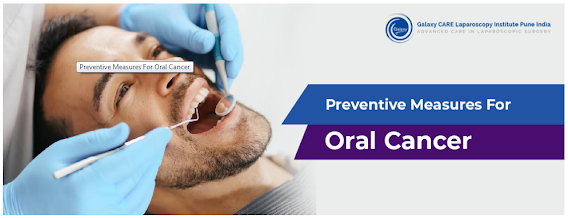PREVENTIVE MEASURES FOR ORAL CANCER
Introduction: Oral cancer is a severe and potentially life-threatening condition that affects millions of people worldwide. It can manifest in various parts of the mouth, including the lips, tongue, gums, and throat. While treatments for oral cancer have improved over the years, prevention remains the most effective approach. By adopting certain preventive measures, individuals can significantly reduce their risk of developing this disease and safeguard their oral health.
Understanding Oral Cancer: Before delving into preventive measures, it's crucial to understand what oral cancer is and what factors contribute to its development. Oral cancer occurs when abnormal cells grow uncontrollably in the oral cavity, forming malignant tumors. Several factors can increase the risk of developing oral cancer, including tobacco use, excessive alcohol consumption, poor oral hygiene, a diet low in fruits and vegetables, prolonged sun exposure (for lip cancer), and certain viral infections, such as human papillomavirus (HPV).
Preventive Measures:
- Regular Dental Check-ups: Scheduling regular dental check-ups is essential for maintaining oral health and catching any abnormalities early on. Dentists are trained to identify signs of oral cancer during routine examinations, allowing for prompt diagnosis and treatment.
- Quit Smoking and Avoid Tobacco Products: Tobacco use, whether it's smoking cigarettes or chewing tobacco, significantly increases the risk of oral cancer. Quitting smoking and avoiding tobacco products altogether can substantially reduce this risk. Seeking support from healthcare professionals or joining cessation programs can aid in the quitting process.
- Limit Alcohol Consumption: Excessive alcohol consumption is another significant risk factor for oral cancer. To lower the risk, it's advisable to limit alcohol intake and adhere to recommended guidelines. For instance, men should consume no more than two alcoholic drinks per day, while women should limit their intake to one drink per day.
- Maintain Good Oral Hygiene: Practicing good oral hygiene is crucial for preventing various oral health issues, including oral cancer. This includes brushing teeth at least twice a day, flossing daily, and using mouthwash. Additionally, individuals should visit their dentist for professional cleanings to remove plaque and tartar buildup.
- Eat a Healthy Diet: A diet rich in fruits and vegetables provides essential vitamins, minerals, and antioxidants that help protect against oral cancer. Incorporating foods like leafy greens, berries, carrots, and citrus fruits can boost overall oral health and reduce the risk of developing cancerous lesions.
- Protect Your Lips from Sun Exposure: Prolonged exposure to the sun's harmful UV rays can increase the risk of lip cancer. To prevent this, individuals should use lip balms or sunscreens with SPF protection, wear wide-brimmed hats, and seek shade when outdoors for extended periods.
- Be Aware of Oral Cancer Symptoms: Being aware of the signs and symptoms of oral cancer is crucial for early detection. Common symptoms include persistent mouth sores, lumps or thickening in the mouth or throat, difficulty chewing or swallowing, numbness in the mouth or tongue, and unexplained bleeding. If any of these symptoms persist for more than two weeks, it's important to consult a healthcare professional promptly.
Conclusion: Preventing oral cancer requires a combination of healthy lifestyle choices, regular dental care, and awareness of potential risk factors. By implementing these preventive measures, individuals can take proactive steps to protect their oral health and reduce their risk of developing this debilitating disease. Remember, early detection is key, so staying vigilant and seeking professional care when needed can make a significant difference in preventing and treating oral cancer.



Comments
Post a Comment